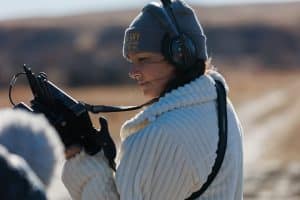Select a subscription plans
You need a subscription to access this content.
SYNOPSIS
A political docu-thriller about the fight for free press in the Muscogee Nation, BAD PRESS provides unparalleled insight into the inner workings of a modern Native American tribe. Just three years after its passage, the 2018 “Free Press Act” was repealed, placing Mvskoke Media, the Muscogee Nation’s sole news outlet, back under control of the chief and his cabinet. Veteran reporter Angel Ellis quickly becomes the key voice of dissent at the decimated news outlet and is willing to lay it all on the line to deliver the truth to her fellow citizens.
OFFICIAL TRAILER
AWARDS & HONORS

Wins:
- International Press Academy: Satellite Awards – Best Motion Picture, Documentary
- American Bar Association: Silver Gavel Awards – Best Documentary (Honorable Mention)
Nominations:
- Critics Choice Documentary Awards – Best First Feature Documentary
- Cinema Eye Honors – Spotlight Award
- The film is a New York Times Critics Pick
FESTIVAL AWARDS
- Sundance Film Festival – US Documentary Competition – Award: Special Jury Award for Freedom of Expression
- True/False Documentary Film Festival – True Life Fund Winner
- Martha’s Vineyard Film Festival – “Best of Fest” Screening Selection
- Sun Valley Film Festival – Award: One in a Million Documentary Award
- RiverRun International Film Festival – Award: Best Documentary Feature
- Dallas International Film Festival – Award: Best Documentary Feature
- MountainFilm Festival – Special Jury Mention: Best Documentary Feature
- Berkshire International Film Festival – Award: Best Documentary Feature
- deadCenter Film Festival – Award: Best Documentary Feature
- Nevada City Film Festival – Award: Best Directors
- Eastern Sierra Mountain Film Festival – Award: Best Documentary Feature
- BendFilm Festival – Award: Best Indigenous Feature Film
- Lane Documentary Festival – Award: Best Social Justice Feature Film
- Santa Fe International Film Festival – Award: Best Documentary Feature
- SCAD Savannah Film Festival – Award: Best Documentary Feature
- Doc NYC – Winners Circle
- LA Skins Fest – Award: Best Documentary Feature
DIRECTORS’ STATEMENT
The battle for the free, unimpeded flow of information to the public is in danger in both the Muscogee Nation and the United States, and in both cases, those who control that flow hold some measure of sway over their elections’ outcomes. Our film holds up a timely and important mirror to those in power in both the Muscogee (Creek) Nation and America. There is no one more qualified to tell this story than director Becca Landsberry-Baker, who has lived this story for more than a decade. It is her heritage, identity, and her chance to effect change within her tribe. Through this film, she will shine a light on government corruption and highlight how an independent press can strengthen tribal sovereignty by informing and educating tribal citizens.
As a filmmaker, telling this story is the evolution of her collective career working in and representing Indigenous media, sharing critical information with an audience including fellow citizens, and speaking truth to power. This documentary represents an opportunity to empower Indigenous voices, harnessing the power of media through journalism and film. Co-director Joe Peeler brings over a decade of documentary editing experience to the project. Joe’s primary goal has been to tell stories that expand the traditional idea of the “American experience” and shed light on diverse and underrepresented communities. His career as a documentarian has made him a passionate defender of free press and media, so the story of the Muscogee Nation is enormously important to and aligned with his values as a filmmaker.
Artistically, our goal is to tell a story from a modern, Native perspective that challenges audiences’ preconceptions about what freedom of press actually looks like in America. Our aim is to paint a complex portrait of the struggles of Indigenous journalists in the most entertaining and humorous way possible.
Accountability Statement by Rebecca Landsberry-Baker:
When I joined the Native American Journalists Association as a member in 2009, I was welcomed by a thriving network of tribal reporters working across Indian Country. I became the youngest editor in the history of the Muscogee Nation News at 22 and was tasked with controlling the flow of information for my fellow 90,000 tribal citizens, which was both exhilarating and terrifying. I experienced firsthand how tribal media serves a critical role in drafting the first version of history, informing citizens, and holding officials to account. I also encountered intimidation, threats, and censorship from tribal leaders, so I’m intimately familiar with the challenges our subjects face in the struggle to balance truthful reporting with accountability to their communities.
In many ways, the on-the-job training I had as editor of the Muscogee Nation News mirrors my experience as a first-time filmmaker. In both roles, I carry a tremendous responsibility to share critical information with an audience that includes my fellow citizens and to speak truth to power. I see this film as an opportunity for a genuine and nuanced representation of modern Native life, including all sides of tribal politics.
As a former tribal media editor and now as the current executive director of the Native American Journalists Association, I work daily to amplify the voices and perspectives of underrepresented Native American communities. This documentary represents the evolution of my personal career, and it is my hope that it will also open new paths to empower Indigenous storytelling more broadly.
As a Muscogee director, my goal is always to elevate and empower Indigenous voices, harnessing the power of media through journalism and film. Now, as a first-time filmmaker, I have an even greater voice for change. Having cameras in the room at campaign events and National Council meetings have led to an observable increase in transparency within the tribal government, which has become a touchstone issue within tribal leadership.
The hard-fought restoration of the free press legislation and the adoption of a constitutional amendment are tremendous milestones for Indian Country and highlight how the film has already successfully and positively impacted transparency for the Muscogee people. A well-informed society is the foundation of a functioning democracy and to safeguard self-determination, tribal citizens must have access to information about their governments. Although free press in Indian Country is a rare exception, transparency is an essential and underutilized aspect of tribal sovereignty that holds tribal governments accountable to their people, fosters an engaged and educated Indigenous citizenry, and ensures a consistent and reliable source of accurate and ethical news and information.
Despite these ideals, I know that by shining a light on the political theater of this otherwise tight-knit community, I risk being ostracized by a vocal minority within the nation and targeted by high-ranking tribal officials who want to keep this story in the dark. Both as a filmmaker and a citizen of my tribe, I believe these risks are necessary and worthwhile in order to share this important story with the world.
PARTICIPANTS
- Angel Ellis (Muscogee Creek)
- Jerrad Moore (Muscogee Creek)
- Jason Salsman (Muscogee Creek)
- Gary Fife (Muscogee Creek)
- Mark Randolph (Muscogee Creek)
- David Hill (Muscogee Creek)
- James Floyd (Muscogee Creek)
- Dode Barnett (Muscogee Creek)
- Graham Lee Brewer (Cherokee)
- Arielle Farve (Chickasaw)
- Lenzy Krehbiel-Burton (Cherokee)
- Liz Gray (Muscogee Creek)
- Travis Scott (Muscogee Creek)
- Rita Courtwright (Muscogee Creek / Mojave)
- Steve Bruner (Muscogee Creek)
- Kalyn Free (Choctaw)
- Brenda Golden (Muscogee Creek)
- Shannon Shaw Duty (Osage)
20% Discount Code: BADPRESS24
Site:http://www.criterionchannel.com/checkout/subscribe/purchase?code=badpress24&plan=yearly
Active: September 1st – 16th, 2024











